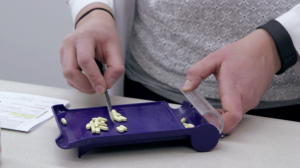NEW YORK (Reuters Health) – The majority of women who become pregnant after in vitro fertilization (IVF) receives progesterone throughout the first trimester, but that may not be necessary, according to a randomized controlled study.
“The message of the current study is that progesterone supplementation in GnRH antagonist cycles may be safely withdrawn during early pregnancy, without any obvious negative effect on pregnancy rates beyond 12 weeks of gestation,” Dr. Dimitra Kyrou from the Centre for Reproductive Medicine, Universitair Ziekenhuis Brussel in Brussels, Belgium, told Reuters Health.
“Although continuation of progesterone until 7 weeks of gestation or longer is a well established clinical practice for the physicians, based on our findings there is no need for longer duration,” the researcher wrote in an e-mail.
In the February 4 online issue of Human Reproduction, Dr. Kyrou and colleagues point out that while the benefit of progesterone administration to support the luteal phase has been well documented in IVF, the optimal timing of withdrawal remains up for debate.
To investigate, they performed a randomized controlled study involving 200 women who underwent a fixed recombinant FSH/GnRH antagonist protocol for IVF or intracytoplasmic sperm injection (ICSI) and fresh embryo transfer three days later. All of the women had a positive beta-hCG test 14 days after embryo transfer followed by a doubling of beta-hCG levels 48 hours later (16 days post embryo transfer).
All of the women received luteal support, with 200 mg vaginal progesterone administered three times daily for 14 days beginning on the day of embryo transfer until the second beta-hCG test (16 days after transfer).
One hundred women in the control group continued to receive progesterone until 7 weeks of gestation, while 100 women in the study group discontinued progesterone on day 16th day after embryo transfer.
Dr. Kyrou and colleagues failed to find any significant differences between the study group and the control group in the spontaneous abortion rate before 7 weeks of gestation (9% vs 12%; P = 0.645) or after 7 weeks of gestation (8% vs 10%; P = 0.806).
Similarly, they didn’t see any marked differences in ongoing pregnancy rates beyond 12 weeks (82% vs 73%; P = 0.175) or in episodes of bleeding (14% vs 19%; P = 0.446).
These findings, Dr. Kyrou and colleagues note, support a prior study that found no influence on pregnancy outcomes of prolonging progesterone supplementation in GnRH agonist cycles.
They caution, however, that only “ideal” patients who were younger than 39 with normal hormonal profiles were included in the study. Older patients and those with endometriosis might need longer progesterone support, they note.
Still, Dr. Kyrou and colleagues think a “modified policy regarding duration of luteal phase support in GnRH antagonist cycles should be recommended.”
In a linked commentary, Dr. Georg Griesinger, from the department of obstetrics and gynecology, University of Lubeck, Germany, says the results of this study, together with results of a previously published study, may ultimately lead to the end of progesterone supplementation in early IVF pregnancies.
However, he feels that it is “not yet” time to abandon the widespread practice. Additional studies with a larger and more diverse group of women are needed to clearly establish non-inferiority for both GnRH-agonist and GnRH-antagonist protocols, Dr. Griesinger writes.
Such studies are “urgently needed,” he concludes, given the sheer number of globally performed IVF cycles and the associated discomfort and costs of progesterone treatment.
Human Reproduction 2011. Published online February 4, 2011.




